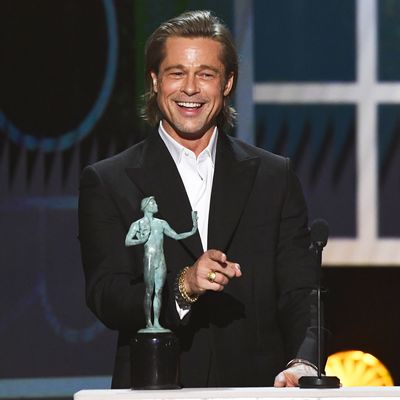
By this point in awards season, Brad Pitt’s march toward a Best Supporting Actor Oscar seems all but inevitable. Not to say anyone’s complaining. In fact, the loudest knock against the Once Upon a Time in Hollywood star is that his warm-up acceptance speeches at events like the Golden Globes, the Screen Actors Guild Awards, and the BAFTAs have been a little too, well, perfect.
Pitt’s “I would’ve shared the raft” nod to his OUATIH foil, Leonardo DiCaprio? Slick yet magnanimous. The crack about avowed foot fetishist Quentin Tarantino having “separated more women from their shoes than the TSA”? Culturally sticky beyond the normal bounds of off-the-cuff remarks. And Pitt joking about putting his SAG statuette on his “Tinder profile”? The platonic ideal of a humblebrag. (Even his acceptance speeches in absentia are noteworthy: the “Hey Britain, heard you just became single — welcome to the club” quip was technically delivered by Margot Robbie.)
As Pitt heads toward the Dolby Theatre’s tuxedoed throng this weekend, we’re less curious as to whether the ageless star will win for his turn as a stunt stand-in in the Ninth Film From Quentin Tarantino™. The more interesting question is: Who is ghostwriting Pitt’s awards speeches?
Pitt (or, rather, his representatives at Once Upon a Time in Hollywood’s studio distributor, Sony) declined to comment when we posed that very query. But at least one outside speechwriting agency reached by Vulture (that asked to remain anonymous because of a confidentiality agreement) confirms that Pitt’s representatives contacted the organization to consult about engaging their services. Which isn’t that surprising; according to a cross-section of awards campaign strategists, public relations executives, and speechwriting professionals, the practice of having nominees in the acting, directing, and writing branches enlist professional help to boost a certain gracious-yet-deserving quality at the awards podium has been one of Hollywood’s worst-kept secrets for many years.
“The most common reason [to hire a ghost acceptance speech writer] is knowing the room. Like, ‘What is the difference between the PGAs, the Globes, and the BAFTAs?’ Knowing the room is key,” says one awards campaigner, who declined to be identified out of ongoing professional sensitivities. “Laziness is the other reason.” This source recalled writing scripted remarks for an awards-nominated screenwriter after the individual kept “going off the mark” in speeches leading up to the Oscars — never mind the nominee’s extensive background with the written word. “It’s tricky business,” the strategist adds. “Actors are much more accepting of speechwriting.”
In an era when Hollywood studios annually mount mega-dollar awards offensives with all the tactical precision and groupthink of political campaigns, it should come as no shock that the act of winning one — or several — of Oscar’s preamble awards has become minutely choreographed. Conventional entertainment-industry wisdom holds that a nominee’s lack of focus or preparation, or the inability to deliver a speech that is at least outwardly “authentic,” can detract from their seeming deservedness for Academy hardware.
Meeting this exigency, hired speechwriting guns extensively confer with a nominee (and their “team”) to help hone in on message and polish jokes while also ensuring the nominee stays on brand (apropos the character role for which he or she is being honored in actors’ cases) in the 45 to 90 seconds usually allotted for the award spotlight. To name one of the more famous operators in this space: Outside her uncredited script-doctoring on such films as Hook and The Empire Strikes Back, the rapier-witted Carrie Fisher is rumored to have regularly ghostwritten stars’ acceptance speeches.
And if Pitt were indeed inclined to up his speeches’ humor quotient using outside help, his team need look no further than in-house talent. The actor’s management firm, Brillstein Entertainment, is regarded as a comedy powerhouse whose lengthy roster includes such stand-up stars as Natasha Leggero and W. Kamau Bell.
Joaquin Phoenix’s meandering, expletive-laden, pro-vegan Golden Globes acceptance last month put Hollywood watchers on notice for a similarly unfocused arrival should the Joker star win a Best Actor Oscar. But, in sharp contrast, Phoenix’s BAFTA-winning speech last weekend functioned more like a policy-point presentation, agitating for on-set inclusivity and increased multiculturalism in a year the British film academy failed to nominate a single person of color for its marquee awards. “This is not a self-righteous condemnation because I’m sorry to say that I’m part of the problem,” the actor said, without a trace of the recalcitrance for which he is infamous offscreen.
In certain Hollywood circles, it begged skepticism: Had pro speechwriters come in to help Phoenix course correct before the Academy Awards?
Fenway Strategies is a speechwriting and communications firm founded by former Obama administration officials Jon Favreau and Tommy Vietor. Although the firm’s most obvious connection is to the political arena, helping speakers prep TED talks or United Nations addresses, Fenway has branched out into Hollywood. And over the last few years the firm has helped ghostwrite awards acceptance speeches for a number of A-list clients; you definitely know them but their identities are protected by non-disclosure agreements.
To hear it from Fenway principal Sam Koppelman, a former speechwriter for Michael Bloomberg and digital strategist for Hillary Clinton who also co-authored the New York Times best seller Impeach: The Case Against Donald Trump, the practice is so widespread among movie, music, and TV stars nowadays, he finds it more astonishing to discover a nominee has eschewed professional speechwriting help than when one seeks it out.
“Writing for actors is a speechwriter’s dream come true,” says Koppelman. “Because unlike politicians, who are not professionals at memorizing lines or delivering them in compelling and charismatic ways, actors actually know how to deliver the lines.”
As for Pitt’s unbroken run of awards speech excellence, the communications strategist is willing to suspend a certain disbelief. “Maybe he just decided to do it himself and he’s really good,” Koppelman adds. “But if you do find out who wrote them, let me know — they’re good at speechwriting.”


